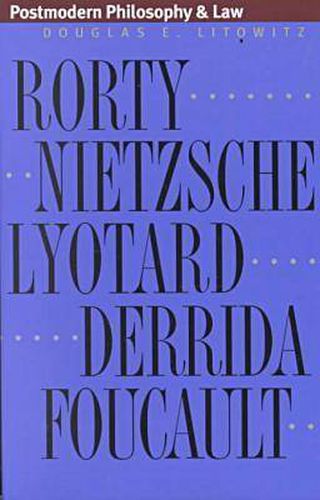Readings Newsletter
Become a Readings Member to make your shopping experience even easier.
Sign in or sign up for free!
You’re not far away from qualifying for FREE standard shipping within Australia
You’ve qualified for FREE standard shipping within Australia
The cart is loading…






Now that contemporary scholars have begun to extend postmodern theory to law, an appraisal of its relevance in that sphere is especially important. This book offers a critical introduction to writings on law by key postmodern philosophers-Nietzsche, Foucault, Derrida, Lyotard, and Rorty-and articulates the strengths and weaknesses of postmodern legal theory. Douglas Litowitz takes a critical stance on these thinkers and determines that postmodern philosophy falls short of a positive jurisprudence-a vision of a just state and a moral legal system-because it takes an unduly external perspective on the law and espouses an unworkable anti-foundationalism. The postmodernist perspective, he argues, is too removed from our legal practices to resolve legal problems like abortion, flag burning, or pornography.
Litowitz shows that postmodernism is so far removed from the language games in which lawyers and judges decide key legal issues that it leaves the internal practice of law untouched, and its radical rejection of foundations precludes a position from which a just legal system might be built. Still, postmodernism can make a significant contribution to legal theory by showing the limits of existing arrangements, focusing attention on genealogy and discourse, and empowering those who have been denied a voice under the legal system.
Postmodern Philosophy and Law bridges the gap between Anglo-American jurisprudence and postmodern theory by discussing not only traditional approaches such as natural law theory and legal positivism but also continental philosophy and critical legal studies. It is the first book to expound and critique postmodern legal theory and its ramifications for a mainstream audience of legal scholars and philosophers.
$9.00 standard shipping within Australia
FREE standard shipping within Australia for orders over $100.00
Express & International shipping calculated at checkout
Now that contemporary scholars have begun to extend postmodern theory to law, an appraisal of its relevance in that sphere is especially important. This book offers a critical introduction to writings on law by key postmodern philosophers-Nietzsche, Foucault, Derrida, Lyotard, and Rorty-and articulates the strengths and weaknesses of postmodern legal theory. Douglas Litowitz takes a critical stance on these thinkers and determines that postmodern philosophy falls short of a positive jurisprudence-a vision of a just state and a moral legal system-because it takes an unduly external perspective on the law and espouses an unworkable anti-foundationalism. The postmodernist perspective, he argues, is too removed from our legal practices to resolve legal problems like abortion, flag burning, or pornography.
Litowitz shows that postmodernism is so far removed from the language games in which lawyers and judges decide key legal issues that it leaves the internal practice of law untouched, and its radical rejection of foundations precludes a position from which a just legal system might be built. Still, postmodernism can make a significant contribution to legal theory by showing the limits of existing arrangements, focusing attention on genealogy and discourse, and empowering those who have been denied a voice under the legal system.
Postmodern Philosophy and Law bridges the gap between Anglo-American jurisprudence and postmodern theory by discussing not only traditional approaches such as natural law theory and legal positivism but also continental philosophy and critical legal studies. It is the first book to expound and critique postmodern legal theory and its ramifications for a mainstream audience of legal scholars and philosophers.